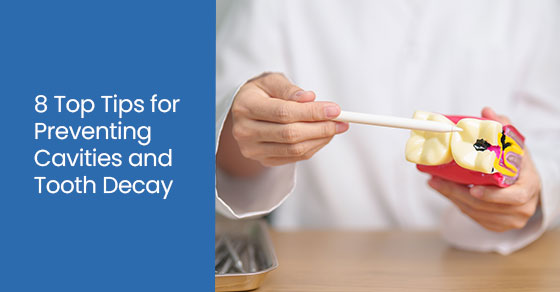Cavities and tooth decay are the most common oral health issues affecting patients of all ages. The majority of adults will have a cavity in their lifetime, but you can minimize your risk by making smart dental hygiene and lifestyle choices.
Tooth decay can be painful, unsightly, and leave you vulnerable to infections and other oral health complications. It’s also irreversible damage. Consequently, prevention truly is the best medicine when it comes to cavities.
Our hope is that this article will inform and guide you as you strive to take the best possible care of your teeth and gums, thereby reducing your likelihood of developing tooth decay.
What is a cavity?
Dental cavities are an example of tooth decay. This is an area on your tooth that has been permanently damaged with small holes in the enamel (the protective outer layer of your teeth).
If untreated, the decay progresses deeper through the layers of the tooth. Bacteria can then enter through the openings in the enamel and cause infection in the innermost layers.
How do cavities form?
You’ve likely heard that sugar causes cavities, and while that is partially true, it’s a dramatic oversimplification. Tooth decay results from an acidic oral environment that weakens and erodes the enamel.
Mouths are naturally full of bacteria. Whenever you eat or drink, you are also feeding the bacteria in your mouth. This bacteria consumes and mixes with sugary and starchy residue, forming dental plaque on the surface of your teeth. Plaque is a sticky film that eventually hardens into tartar, which can only be removed by your dentist and special dental tools.
As the bacteria feed on leftover sugars and starches, it produces acids. These acids cause demineralization, which weakens tooth enamel. Tiny openings or holes form in the enamel, allowing bacteria and acid to reach the tooth’s inner layers.
How do I prevent cavities and tooth decay?
1. Brush your teeth twice a day
Brushing is crucial for oral health. It removes food debris and plaque that can lead to tooth decay. Brush for two minutes at a time, twice a day. Ensure you’re using a soft-bristled toothbrush, as hard bristles can damage your enamel.
Additionally, wait at least 30 minutes after eating before brushing your teeth, as the enamel is softest and most vulnerable during that window.
2. Use a fluoride toothpaste
Fluoride plays an important role in combating tooth decay. It strengthens your teeth by accelerating remineralization in the tooth enamel, thereby reducing your risk of cavities. Consequently, you should always brush your teeth with high-quality, fluoride toothpaste.
3. Floss once per day
Dentists in Mississauga recommend flossing once per day, ideally at night after brushing your teeth. Dental floss reaches where your toothbrush can’t, so it removes food debris and plaque that would otherwise be missed. Leftover food debris and plaque spurs the development of cavities.
When flossing, use gentle back-and-forth motions between each tooth to dislodge debris.
If you’re just starting to floss again after a long hiatus, your gums may bleed a little. The solution is to keep flossing. Soon, your sensitive gums will adapt and stop bleeding every time you floss.
4. Use an antibacterial mouthwash
A high-quality, antibacterial mouthwash is a great addition to your oral hygiene regime. It washes away lingering food particles, removes acid, and lowers the amount of bacteria in your mouth. The fewer bacteria, the less acid.
Additionally, many antibacterial mouthwashes also contain fluoride, providing even more protection against tooth decay.
5. Minimize sugar
Sugar may not cause tooth decay directly; however, it does feed the oral bacteria that produces the acid that wears down yourenamel,l leading to cavities. That’s why sugar is considered the biggest culprit in cavity formation.
Besides improving your at-home oral hygiene routine, cutting back on sugar is the best thing you can do for your oral health. When you eat less sugar, the bacteria in your mouth also eats less sugar. Your mouth becomes less acidic, which preserves the strength of your enamel.
Sticky foods and sugary beverages are the worst for your teeth. Since sticky and sweet foods stick to your teeth, they’re harder to remove. They turn into a consistent snack for oral bacteria until you brush your teeth properly.
Sugary beverages effectively bathe your teeth in sugar every time you take a sip. This prolonged exposure and re-exposure to sugar keeps your teeth coated in a sweet film, which feeds the bacteria in your mouth.
6. Drink lots of water
Instead of pop or sports drinks,prioritizee drinking water to stay hydrated. Water washes away food debris, sugars, and particles to keep your mouth healthy. Staying hydrated also helps prevent dry mouth. A dry mouth is an acidic mouth—and acid eats away at your tooth enamel.
7. Visit your Mississauga dentist regularly
There’s a reason why you’re supposed to see a dentist every six months: it’s crucial for preventing cavities, tooth decay, and other oral health conditions. When you visit a dental clinic in Mississauga, you receive a thorough and professional cleaning from a trained dental hygienist.
They remove all plaque and tartar build-ups, which reduces your risk of developing a cavity in the future. Moreover, your dentist checks for and treats any cavities before the decay worsens.
8. Ask about preventative treatments
At Bristol Dental Clinic, we offer several preventative treatments to further safeguard your teeth against cavities and tooth decay. For instance, dental sealants are an effective method against bacterial growth. Sealants are protective coatings that cover the chewing surface of your back molars, where cavities are most likely to develop.
You also receive a fluoride treatment during your dental exam and cleaning. The fluoride can be administered in a number of ways, including as a gel, varnish, foam, or rinse. Treatments generally only take a few minutes but reduce your risk of cavities while remineralizing your enamel.
Contact Bristol Dental for a Dental Clinic in Mississauga
Bristol Dental Clinic in Mississauga provides proactive, comprehensive, and personalized care to protect your smile. Our dental team uses preventative dentistry to minimize your risk of cavities, tooth decay, and other oral health conditions.
Every time you visit our clinic, we perform a thorough examination and cleaning (while offering tips for better at-home care) to prevent tooth decay from forming. If you have a cavity, we treat it promptly before it gets worse.
To book an appointment with a dentist in Mississauga, call Bristol Dental Clinic at 866-673-2109 or contact us here.





